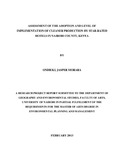| dc.description.abstract | The purpose of this study was to assess the adoption and level of implementation of
Cleaner Production (CP) by star-rated hotels in Nairobi County. The specific objectives of the
study were to: 1) assess which CP measures were being implemented by star-rated hotels, 2)
determine what factors influence the adoption and implementation of CP by star-rated hotels; 3)
assess the relationship between star-rating and CP implementation; 4) assess the relationship
between CP implementation and compliance; and 5) assess the relationship between CP
implementation and hotel occupancy. The study was a census involving all the twenty-four (24)
star-rated hotels in Nairobi County: eight of which are in the 5-star category; one in 4-star; 11 in
3-star; and four in 2-star. Thirteen (13) hotels: four 5-star; one 4-star; five 3-star; and three 2-star
(N=13; response rate of 54%) participated in the study. A survey of the hotels was conducted in
the period January 2009 to July 2009. Primary data for the study was collected through a
researcher-administered questionnaire, direct observations and interviews with key informants.
The respondents in the survey included middle level managers and technical officers in various
operational and technical areas. Secondary data was collected through a review of published and
un-published reports.The study found out that the level of awareness about CP among the star-rated hotels was generally good at 77 per cent. Key sources of information about CP were found to be the Ministry of Tourism and Wildlife (77%) and mother companies of hotel chains (38%). Perceptions that CP would enhance compliance with government laws and regulations, use of corporate social responsibility as the hotels’ business strategy, commitment to good environmental and social practices, availability of new technology and expertise and peer competition were found to be the key factors that influenced the adoption and implementation of CP. Key barriers to the implementation of CP were found to be lack of government-led efforts and incentives, lack financing mechanisms and weak enforcement of relevant laws and regulations by the Government. The hotels were found to be generally compliant with government regulations: 85% for National Environment Management Authority requirements and 77% for all the laws and regulations applicable to the hotel industry. The most common energy conservation measures included staff sensitization (100%), energy saving reminders for guests (77%) and installation of energy saving appliances (62%). However, these practices were not found to be adequate since 85% of the hotels did not have benchmarks, set targets and put measures in place to attain the targets. The same trend was noted in solid waste management and air pollution management. The hotels were found to be generally good at taking short-term measures but lacked mechanisms for continuous improvement. Only 31% of the hotels had green procurement policies and only 38% sensitized suppliers on green procurement practices. Seventy per cent (70%) of the hotels had developed food safety policies and trained relevant staff in their implementation. However, only 31% had undertaken relevant certification. On occupation healthy and safety, 85% of the hotels had a department charged with that responsibility and 70% had accomplished all occupational health and safety measures as prescribed by law. Sixty two per cent (62%) had clear and standard human resources management policies, 92% had employed local staff in key management positions, 85% paid competitive salaries and 70% allowed staff to join trade unions.Spearman’s rank correlation ( ) analysis (at 0.05 level of significance) was used to determine significant relationships existed between star-rating and CP implementation; CP implementation and compliance, and CP implementation and hotel occupancy. The study found out that there is a significant positive relationship between star-rating and CP implementation ( =0.756, p<0.05) and between CP implementation and compliance of the hotels with government regulations ( =0.713, p<0.05). The study found no significant relationship between CP implementation and hotel occupancy ( =0.082, p=0.789).
On the basis of findings of this study, it is recommended that the Government of Kenya
should develop a CP legislation to encourage and guide its integration in various industries
including the hotel industry. The Government of Kenya should also revise the environmental
criteria in current star-rating scheme. Hotel should, on the other hand, develop more
comprehensive CP policies and programmes. The hotels are also encouraged to explore
implementation of other voluntary initiatives that are complementary to CP. These may include
the relevant ISO certification regimes and the local ecotourism rating scheme developed by Eco-
Tourism Kenya. The Kenya National Cleaner Production Center, the Kenya Association of Hotel
Keepers and Caterers, non-governmental organizations and donors work more with the
Government in designing and implementing programmes aimed at enhancing the rate of adoption
the implementation of CP. Finally, for researchers, more in depth studies on specific aspects of
CP, corporate social and environment responsibility of the hotels are recommended. | en |

